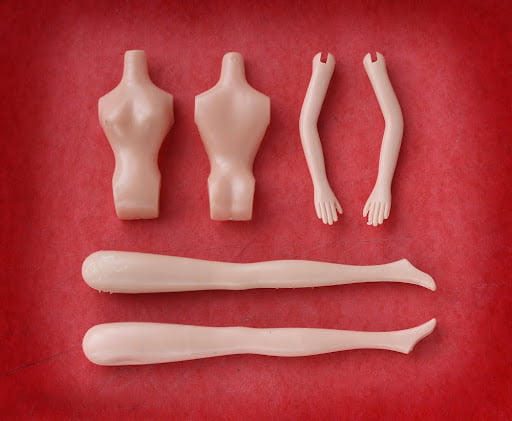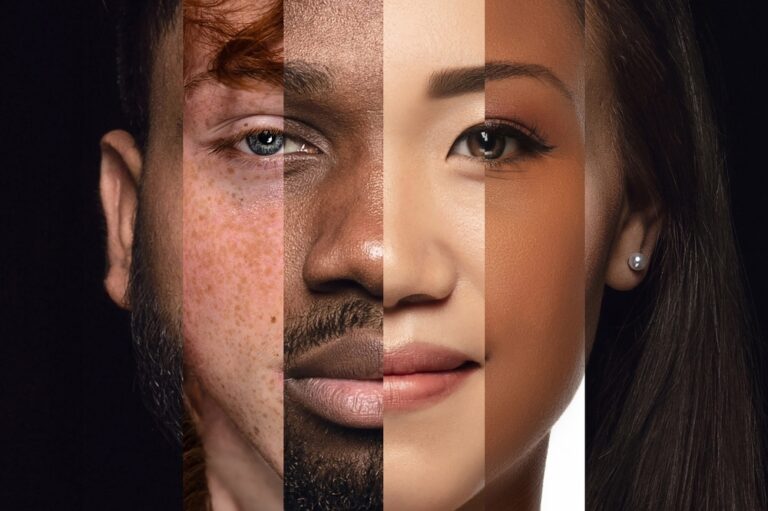Your Guide to Body Parts in Chinese

Understanding the vocabulary related to body parts in Chinese is a vital step in achieving fluency in the language. This knowledge not only helps with daily communication but also enriches your cultural understanding and ability to express yourself in diverse contexts.
At Mandarin Blueprint, we offer a unique and innovative approach to learning Chinese, ensuring that you grasp the essentials quickly and effectively. In this guide, we’ll delve into the vocabulary of body parts in Chinese, ensuring you are well-equipped to describe, discuss, and understand conversations related to this fundamental topic.
Why learning body parts in Chinese is essential
The human body is a common topic of discussion in any language, and Chinese is no exception. Whether you’re at the doctor’s office, describing someone, or simply want to express how you’re feeling, knowledge of body part vocabulary is indispensable.
For beginners, this vocabulary serves as a foundational building block, while advanced learners can deepen their understanding and precision in communication. Beyond practical communication, understanding these terms also opens doors to a richer understanding of Chinese idioms and expressions, many of which draw upon body part vocabulary.
A comprehensive guide to body parts in Chinese
Whether you’re describing physical sensations, detailing specific body parts, or simply aiming to enrich your Mandarin vocabulary, it all starts with knowing the Chinese for various body parts. Let’s jump in.
Head and face
The human face is a focal point of expression and communication, playing a crucial role in our interactions and non-verbal cues. Let’s look at the various components of the head and face, providing clear explanations and practical examples to enhance your vocabulary and understanding of these essential body parts in Chinese.

- 头 (tóu — second tone) — head: This word is essential for everyday conversation and is used in many common phrases, such as “头疼” (tóuténg), meaning “headache.” Fun fact: In Chinese culture, the head is considered the most important part of the body, and it’s considered impolite to touch someone’s head without permission.
- 眼睛 (yǎnjing — third tone and neutral tone) — eyes: Eyes are often referred to as the “窗户 of the soul” (chuānghu – window). A well-known Chinese compliment is “你的眼睛很漂亮” (Nǐ de yǎnjing hěn piàoliang), meaning “Your eyes are very beautiful.”
- 鼻子 (bízi — second tone and neutral tone) — nose: In traditional Chinese medicine, the nose is associated with the lungs, and a healthy nose is a sign of strong lung qi (energy).
Related Reading: Tone Change Rules In Mandarin Chinese
The torso
Diving deeper into the intricacies of human anatomy through the lens of Mandarin Chinese, we now shift our focus to the torso. This central part of the body, encompassing everything from the chest to the abdomen, plays a pivotal role in both function and language. In this section, we will unravel the specific Mandarin terms for each component of the torso, enhancing your vocabulary and providing a holistic view of how these body parts are articulated in the Chinese language.
- 胸 (xiōng — first tone) — chest: This word is commonly used in contexts related to health and physical appearance. A common expression is “胸闷” (xiōngmèn), meaning a feeling of tightness or discomfort in the chest.
- 背 (bèi — fourth tone) — back: The back is often used metaphorically in Chinese to describe bearing responsibilities, as in “背负” (bèifù), meaning “to bear” or “carry on one’s back.”
Limbs
Our limbs facilitate a myriad of actions and movements, playing a vital role in our daily lives. Whether it’s reaching for an object or taking a step forward, understanding these terms is crucial for clear and precise communication about the body in Chinese.
- 手 (shǒu — third tone) — hand: Hands are central in Chinese culture and used in greetings, gestures, and daily activities. The expression “手忙脚乱” (shǒu máng jiǎo luàn), mentioned previously, is a playful way to describe a hectic situation.

- 腿 (tuǐ — third tone) — leg: Legs are associated with strength and stability. In sports and fitness, strong legs are highly valued, and there are many exercises focused on leg strength.
Internal organs
Beneath the surface, our bodies are powered by a complex network of internal organs, each playing a crucial role in maintaining life and health. In Mandarin Chinese, these vital components have specific and often unique terms.
- 心脏 (xīnzàng — first tone and fourth tone) — heart: The heart is considered the “emperor of all organs” in Chinese medicine, playing a crucial role in maintaining life and health.
- 肝 (gān — first tone) — liver: The liver is associated with the Wood element in Chinese medicine and is believed to be crucial for the smooth flow of qi and blood in the body.
Related Reading: Drink like a Local — A Guide to Alcohol in China
Sensitive body parts in Chinese
When delving into conversations about the human body in Mandarin Chinese, it’s essential to approach more private and sensitive body parts with a level of decorum and precision in terminology.
Using the appropriate and respectful language not only reflects your proficiency in Chinese but also ensures that the conversation maintains a professional and courteous tone.
In contexts such as medical consultations or discussions related to health and anatomy, it’s important to use precise and formal terminology. For example, “乳房” (rǔfáng) directly translates to “breast.” This term is commonly used in medical and formal contexts, ensuring clarity and respect in the conversation.
Similarly, when referring to the genitals, the term “生殖器官” (shēngzhí qìguān) is used. This term is anatomically specific and is considered formal and respectful, making it appropriate for use in medical or educational settings. It directly translates to “reproductive organs,” encompassing both male and female genitalia.
It’s crucial to be mindful of the context in which these terms are used, as well as the relationship between the speakers. In Chinese culture, discussions about private parts of the body are generally considered personal and are approached with discretion. Using the correct terminology shows cultural awareness and respect towards the sensitivity of the topic.
Related Reading: 30 Chinese Cuss Words For Any Situation
Fun with phrases
The Chinese language is rich with expressions, idioms, and phrases, many of which incorporate various body parts to vividly convey emotions, describe personal characteristics, or express heartfelt wishes.
Gaining proficiency in these expressions not only enhances your vocabulary but also brings a playful and authentic flair to your usage of the language, showcasing your deep understanding of Chinese culture and colloquialisms.
- 眉飞色舞 (méi fēi sè wǔ): Literally “eyebrows flying and colors dancing,” this phrase is used to describe someone who is extremely happy and in high spirits. It paints a vivid picture of joy and exuberance, making it a delightful expression to use in conversations.

- 耳朵软 (ěrduo ruǎn): Translating to “soft ears,” this expression refers to a person who is easily persuaded or influenced, especially by sentimental words. It’s a playful way to describe someone’s susceptibility to persuasion.
Related Reading: The Definitive Guide to Chinese Proverbs, Sayings, and Quotes
- 嘴甜心苦 (zuǐ tián xīn kǔ): “Sweet mouth but a bitter heart.” This phrase describes someone who speaks sweetly or flatteringly but may have ulterior motives or feel differently inside. It serves as a caution to be mindful of people who may not be as genuine as they appear.
- 胆小如鼠 (dǎn xiǎo rú shǔ): Literally, “courage is as small as a mouse,” used to describe someone who is very timid or easily frightened. It’s a vivid way to discuss someone’s personality or reaction in a specific situation.
By weaving these expressions into your conversations, you not only display your mastery of body parts in the Chinese language but also connect with native speakers on a more authentic and cultural level.
Whether you’re describing someone’s characteristics using “耳朵软” or expressing happiness with “眉飞色舞,” these phrases add a layer of richness and playfulness to your communication.
Being familiar with these phrases contributes significantly to understanding spoken Chinese, as they are commonly used in daily conversations, TV shows, and literature. It’s these nuances and idiomatic expressions that truly bring the language to life, allowing learners to engage more deeply and meaningfully with the Chinese language and culture.
Cultural insights and nuances
Understanding body part vocabulary also provides insight into various Chinese idioms and expressions. For instance, “破费” (pòfèi), literally “broken liver and gallbladder,” is a heartfelt way to thank someone for going to great lengths to help. Knowing the cultural context and nuances enhances both your language skills and your understanding of Chinese culture.
Related Reading: 120 Basic Chinese Words and Phrases to Help You Survive
The heart of the matter
From the tip of the head down to the toes, we’ve painted a vivid picture of how body parts are woven into the fabric of Mandarin Chinese and, by extension, into the culture itself.
But why stop here? Just as the body is a system of interconnected parts, language learning is a journey of interconnected experiences and revelations.
Imagine being able to speak fluent Chinese three times faster than a full-time student, all while doing it part-time and without being overwhelmed. Imagine not having to waste thousands of dollars on ineffective learning methods. This isn’t just a dream — it’s a reality that Mandarin Blueprint has unlocked for learners worldwide.
Join us for a FREE webclass, where we equip you with the skills to achieve Chinese fluency faster than you ever imagined possible. You’ll learn the secrets that make Mandarin fluency easy, fast, and fun.
Register now and secure your spot in this transformative webclass. Save your seat, join the community, and take the next step in your Mandarin learning adventure.








